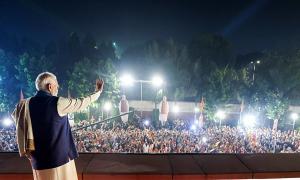A top Pakistani militant leader accused of masterminding several terror plots has come out against suicide attacks, terming it as prohibited by Islam and against the Shariah (Islamic Laws).
Founder leader of the banned Lashkar-e-Tayiba and leader of Jamat-ud-Dawah (JUD), Hafiz Muhammad Saeed, has said killing of innocent people through bomb explosions and suicide attacks is strictly prohibited in Islam and is against the Sharia.
The interesting observation by Saeed, who has been blamed for many terrorist attacks in India and figured top of the list of wanted persons, was made during a sermon at a prayer meeting in Lahore on Friday.
"Islam strictly forbids shedding the blood of innocent people, nor even that of a non-Muslim, or a non-believer, and there is clearly outlined punishment for such horrendous acts in Islam," a JUD press release in Islamabad quoted him as saying.
His comments followed many prominent clerics, including those affiliated to prominent religious party Jamaat Ulema Islami (JUI) headed by Fazlur Rehman, declared suicide attacks against the tenets of Islam.
Saeed has launched a movement opposing President Pervez Musharrf's initiatives to reform the Huddood laws weighed heavily against women, particularly in case of rape victims.
In his speech, Saeed said Islam has accorded basic human rights to mankind and a Muslim state is expected to stringently adhere to them to maintain law, order, and harmony in society because states, which fail to give their people justice and due rights, do not survive for long.
The JUD has been accused of funding terror plots abroad, including in India, with the millions of US dollars raised for the earthquake victims in Pakistan.








More from rediff